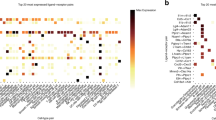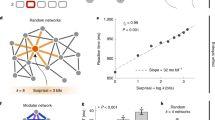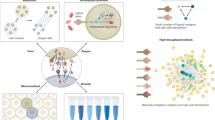Abstract
VARIOUS small molecules, up to 1,600 molecular weight1, can pass directly between certain animal cells in contact, probably through gap junctions2,3. Such communication may partly mediate growth control in multicellular organisms and cultured cells, so that disturbances in the normal pattern of communication could be related to malignant growth4,5. The 3H-nucleotide transfer method6, based on metabolic cooperation7 has shown that communication is not always an all-or-none phenomenon, but may be selective8,9. For example, human mammary epithelial cells from benign tumours or milk do not communicate with human breast fibroblasts (HumF), although either type can communicate well with homologous cells. We have examined the communication between cancer cells from several human breast cancer sources and found that, unlike normal mammary epithelium, they do not show selectivity in communication. The cancer cells fall into one or other of the two functional groups we have defined as non-selective communicators (communicate with all cells capable of communication) or non-communicators (unable to communicate with homologous or heterologous cells) suggesting that the change to malignancy involves some change in the pattern of cell communication.
This is a preview of subscription content, access via your institution
Access options
Subscribe to this journal
Receive 51 print issues and online access
$199.00 per year
only $3.90 per issue
Buy this article
- Purchase on Springer Link
- Instant access to full article PDF
Prices may be subject to local taxes which are calculated during checkout
Similar content being viewed by others
References
Simpson, I., Rose, B. & Loewenstein, W. R. Science 195, 294 (1977).
Gilula, N. B., Reeves, O. R. & Steinbach, A. Nature 235, 262 (1972).
Azarnia, R., Larsen, W. J. & Loewenstein, W. R. Proc. natn. Acad. Sci. U.S.A. 71, 880 (1974).
Loewenstein, W. R. & Kanno, Y. J. Cell Biol. 22, 565 (1964).
Borek, C., Higashino, S. & Loewenstein, W. R. J. membr. Biol. 1, 274 (1969).
Pitts, J. D. & Simms, J. W. Expl Cell Res. 104, 153 (1977).
Subak-Sharpe, J., Burk, R. R. & Pitts, J. D. J. cell. Sci. 4, 353 (1969).
Fentiman, I. S., Taylor-Papadimitriou, J. & Stoker, M. Nature 264, 760 (1976).
Pitts, J. D. & Burk, R. R. Nature 264, 762 (1976).
Lasfargues, E. Y. & Ozzello, L. J. natn. Cancer Inst. 21, 1131 (1958).
Hallowes, R. C., Millis, R., Stoker, M. & Taylor-Papadimitriou, J. clin. Oncol. 3, 81 (1977).
Rose, H. N. & McGrath, C. M. Science 190, 673 (1975).
Young, R. K., Cailleau, R. M., Mackay, B. & Reeves, W. J. In vitro 9, 239 (1974).
Sheridan, J. D. J. Cell Biol. 45, 91 (1970).
Author information
Authors and Affiliations
Rights and permissions
About this article
Cite this article
FENTIMAN, I., TAYLOR-PAPADIMITRIOU, J. Cultured human breast cancer cells lose selectivity in direct intercellular communication. Nature 269, 156–158 (1977). https://doi.org/10.1038/269156a0
Received:
Accepted:
Published:
Issue Date:
DOI: https://doi.org/10.1038/269156a0
This article is cited by
-
Establishment of tight junctions between cells from different animal species and different sealing capacities
The Journal of Membrane Biology (1989)
-
Characterization of epithelial cell islets in primary monolayer cultures of human breast carcinomas by the tetrazolium reaction for glucose 6-phosphate dehydrogenase
Virchows Archiv B Cell Pathology Including Molecular Pathology (1986)
-
Cell-to-cell communication in monolayers of epithelioid cells (MDCK) as a function of the age of the monolayer
The Journal of Membrane Biology (1984)
Comments
By submitting a comment you agree to abide by our Terms and Community Guidelines. If you find something abusive or that does not comply with our terms or guidelines please flag it as inappropriate.



